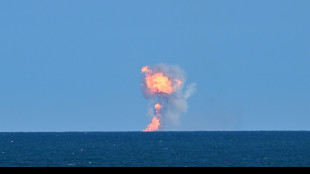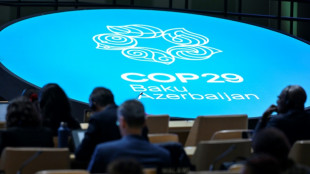
-
 Myanmar led world in landmine victims in 2023: monitor
Myanmar led world in landmine victims in 2023: monitor
-
ICC to sentence Timbuktu war criminal

-
 Ugandan opposition figure Besigye 'kidnapped', says wife
Ugandan opposition figure Besigye 'kidnapped', says wife
-
Australia's Jason Day eyes more major glory after resurgence

-
 Machu Picchu security boosted after visitors spread human ashes
Machu Picchu security boosted after visitors spread human ashes
-
Popovic hails Australia character in 'crazy' World Cup qualifier

-
 Taliban govt clearing 'un-Islamic' books from Afghanistan shelves
Taliban govt clearing 'un-Islamic' books from Afghanistan shelves
-
Argentina beat Peru as Uruguay hold Brazil

-
 Asian markets struggle as traders weigh geopolitical tensions
Asian markets struggle as traders weigh geopolitical tensions
-
Tatum stars as Celtics end Cavaliers unbeaten start

-
 Hurting India under pressure in blockbuster five-Test Australia series
Hurting India under pressure in blockbuster five-Test Australia series
-
'They killed her dream': Israel strike leaves woman footballer in coma

-
 Iraq holds its first census in nearly 40 years
Iraq holds its first census in nearly 40 years
-
Iraqis face tough homecoming a decade after IS rampage

-
 Russian net tightens around last civilians left in eastern Ukraine
Russian net tightens around last civilians left in eastern Ukraine
-
Olympic champion Tebogo aims to inspire next generation of African athletes

-
 Valencia on target as ten-man Ecuador upset Colombia
Valencia on target as ten-man Ecuador upset Colombia
-
'Rust' to premiere three years after on-set shooting

-
 Strike at French cognac maker Hennessy over measures in China spat
Strike at French cognac maker Hennessy over measures in China spat
-
Xi, Lula meet in Brasilia to 'enhance ties'

-
 SpaceX fails to repeat Starship booster catch, as Trump watches on
SpaceX fails to repeat Starship booster catch, as Trump watches on
-
'I have left a legacy': Nadal retires from tennis

-
 US recognizes Venezuela opposition's Gonzalez Urrutia as 'president-elect'
US recognizes Venezuela opposition's Gonzalez Urrutia as 'president-elect'
-
European powers, US seek to censure Iran at UN nuclear watchdog board

-
 UNAIDS chief says husband, Ugandan opposition figure Besigye, 'kidnapped'
UNAIDS chief says husband, Ugandan opposition figure Besigye, 'kidnapped'
-
Nadal's sensational career ends as Netherlands defeat Spain in Davis Cup

-
 US announces talks with Israel over civilian casualties in Gaza
US announces talks with Israel over civilian casualties in Gaza
-
SpaceX fails to repeat Starship booster catch, as Trump looks on

-
 G20 summit ends with Ukraine blame game
G20 summit ends with Ukraine blame game
-
Trump appoints TV celebrity 'Dr. Oz' to key US health post

-
 European stocks fall on Ukraine-Russia fears, US focused on earnings
European stocks fall on Ukraine-Russia fears, US focused on earnings
-
Last-gasp Szoboszlai penalty rescues Hungary draw with Germany

-
 Germany, Netherlands draw as Nations League group stage ends
Germany, Netherlands draw as Nations League group stage ends
-
Hong Kong tycoon Jimmy Lai takes witness stand in collusion trial

-
 Guardiola set to extend stay as Man City boss - reports
Guardiola set to extend stay as Man City boss - reports
-
Minnows Botswana hold Egypt to qualify with Mozambique, Tanzania

-
 Inter Miami coach Martino leaving club for 'personal reasons' - club source
Inter Miami coach Martino leaving club for 'personal reasons' - club source
-
Chinese man sentenced to 20 months for Falun Gong harassment in US

-
 Hong Kong court jails 45 democracy campaigners, drawing condemnation
Hong Kong court jails 45 democracy campaigners, drawing condemnation
-
'I did it for Rafa': Alcaraz after keeping Spain Davis Cup dream alive

-
 Alcaraz keeps Spain and Nadal Davis Cup dream alive
Alcaraz keeps Spain and Nadal Davis Cup dream alive
-
Trump names China hawk Howard Lutnick commerce secretary

-
 Europe's pivotal role in bid to strike COP29 climate deal
Europe's pivotal role in bid to strike COP29 climate deal
-
MotoGP champion Martin falls on Aprilia debut

-
 Bodies burned after Haiti police, civilians kill 28 alleged gang members
Bodies burned after Haiti police, civilians kill 28 alleged gang members
-
'Probably my last match': Nadal after Davis Cup singles defeat

-
 Iran faces new censure over lack of cooperation at UN nuclear meeting
Iran faces new censure over lack of cooperation at UN nuclear meeting
-
Afghan woman teacher, jailed Tajik lawyer share top rights prize

-
 Pressure mounts on Scholz over bid for second term
Pressure mounts on Scholz over bid for second term
-
Take two: Biden makes it into G20 leaders' photo


Civilians trickle out of Kramatorsk after station attack
Mini-vans were headed to a church in Kramatorsk in east Ukraine on Saturday morning to collect evacuees after a deadly rocket attack on a train station in the city.
Almost 80 people, most of them elderly, took shelter overnight in the building, not far from the terminal targeted in the strike on Friday.
"There were around 300 to 400 people who rushed here after the strike," Yevgeny, a member of the protestant church, told AFP.
"They were traumatised. Half of them ran to shelter in the cellar, others wanted to leave as soon as possible. Some were evacuated by bus in the afternoon (on Friday). In the end, almost 80 stayed here and I hosted seven at my house," he said.
Evacuees slept on mattresses on the floor in the church and were offered breakfast by volunteers on Saturday morning as they waited for the bus to take them out of the path of a feared Russian offensive in the region.
Moscow denied responsibility for the rocket attack on Friday morning, which killed 52 and injured a further 109 people, according to the latest official count.
Six weeks into President Vladimir Putin's invasion, Moscow has shifted its focus to eastern and southern Ukraine after stiff resistance ended plans to swiftly capture the capital Kyiv.
The stop in Kramatorsk was being used as the main evacuation hub for refugees from the parts of the eastern Donbas region still under Ukrainian control.
- Station closed -
Twenty-four hours after the strike on Saturday morning, the train station was closed and the area cordoned off by police.
Cars charred by the explosion were still sat on the forecourt, while some of the station's blown-out windows had been boarded up.
A sizeable chunk of the rocket's twisted fuselage was still to be found on the grassy roundabout in front of the station.
In Kramatorsk, the night into Saturday and the morning were quiet. Regular heavy artillery explosions could be heard in the distance -- towards the frontline to the northwest -- but none nearby.
The city is now squeezed between the frontlines, to the south and east by the pro-Russian separatist statelets of Donetsk and Lugansk, and to the north by the advance of the Russian army.
The lines of engagement have been relatively stable but daily exchanges between opposing forces have been heated.
The civil-military authorities in Ukrainian-controlled regions of Donetsk and Lugansk, which make up the Donbas, have repeatedly called for civilians to leave the region for fear of a Russian move.
Trains and buses have been laid on for evacuees to leave the area, supported by the work of volunteers.
While the station in Kramatorsk is out of service, four trains are slated to leave from the nearby city of Slavyansk for the west of the country, according to the Ukrainian rail operator.
Other local trains are also set to run, though departure details have yet to be shared for security reasons.
- Two-way street -
Discreetly, evacuations have also continued in the other direction, by road towards the pro-Russian territories.
Convoys of cars, often old Russian-made Ladas with suitcases strapped to the roof, set off every day for the Russian-controlled zone to the north, with the tacit consent of Ukrainian forces manning checkpoints, an AFP journalist understood.
"We are going there because we have relatives there. There is food, it's calm, there are no issues," a 30-year-old man travelling with his family told AFP.
"There are good and bad people on both sides," he said, exchanging Ukrainian currency for Russian rubles at the side of the road.
Once the industrial heartland of the Soviet Union, the former coal-mining region of Donbas, divided by war since 2014, is traditionally more favourable towards Russia.
Nostalgia for the Soviet era comes through in conversation with residents, who regret the closure of the region's big factories, and often reserve criticism for the government in Kyiv.
What is more, many of them, including women and children, do not intend to flee the arrival of Russian forces.
T.Sanchez--AT
